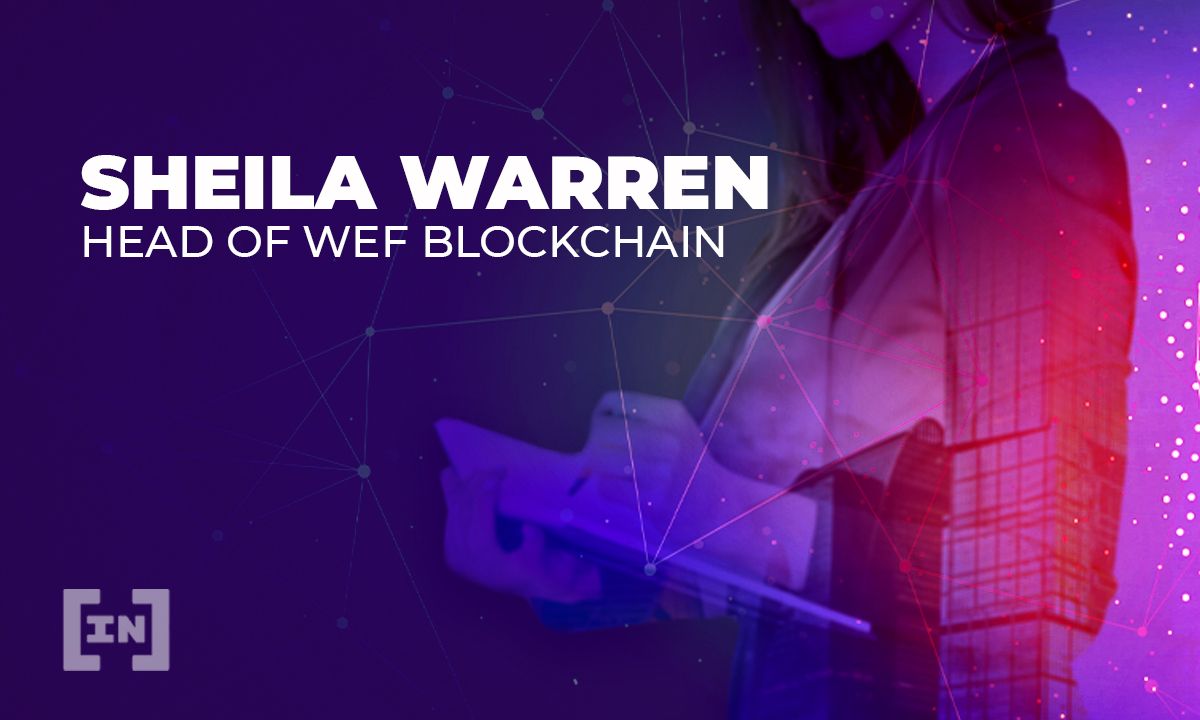The future of cryptocurrency and blockchain technology is hotly debated, with different actors bringing their opinions to the table. The World Economic Forum focuses on public-private cooperation to shape policy on a range of issues, including cryptocurrency and blockchain.
BeinCrypto spoke to Sheila Warren, the Head of Data, Blockchain, and Digital Assets and the Deputy Head of the Centre for the Fourth Industrial Revolution. We wanted to find out how she brings all these stakeholders together and what the future of crypto could look like.
Blockchain and the World Economic Forum
BIC: What is the goal of the World Economic Forum (WEF) blockchain platform?
Sheila Warren: We are a policy and governance-focused institution. So the general theory of the C4IR (Centre for the Fourth Industrial Revolution) is that of policy, regulation, governance.
All of this stuff really tends to lag technology for a variety of reasons, some of which are very reasonable reasons, some of which are not really good reasons.
How do we create more agile methods of regulation that can effectively regulate, accelerate benefits for innovation, but also mitigate some of the risks of technology? So that’s kind of the overarching theme, if you will, of the C4IR.
What we try to do is make sure that we bring together to form and fashion multi-stakeholder communities, public-private sector, third sector, academics, other experts, to really provide a nuanced view of what’s happening in this space.
What I think the most important thing has become for us, and what I’m really proud of is our kind of brand and voice in this space is very much that of what I call pragmatic optimism.
So we are definitely bullish on the tech on crypto over the long term but we’re very practical, and we have no skin in the game. We are one of the very few truly neutral organizations that are opining on things here with regularity and with conviction and with authority.
I think it’s turned out to be extremely important in this space. A lot of what I do, frankly, is trying to cut through the hype. Try to cut through, nonsense, to use a polite word for it, and just try to stay there.
There’s a lot of noise in this space, a lot of froth. That doesn’t mean there’s not also true signal. It doesn’t mean something really exciting, isn’t also happening. Those can both be true.
So we try to kind of carve a straight line forward and I think we’ve been pretty unerring. I think it’s to provide nuance, in a world ecosystem that is not exactly prone to nuance, I would say that’s my fundamental goal.
BIC: What has the biggest challenge been in working on blockchain policy with the WEF?
SW: A lot of people have come to this with black and white views. That’s gotten better. I think over the years, at least in some spaces, I think most people now address bitcoin, for example, with some nuance. But that was not the case.
The first two years I was in this role, it was: Yes or no, good or bad, evil or dark or light. It’s very, very black and white. You see this with NFT’s. Now people are like, “these are great, these are the most important thing that’s happened ever” and other people are like, “this is so dumb, it’s gonna vanish in two seconds.”
So it’s a matter of kind of moving through the fads in this space and saying something here is true, what is that thing? But I think the hardest thing is that there’s so much money to be made.
Therefore, people have very strong agendas that are backing for reasons that aren’t always transparent, that aren’t always obvious. They’re very hard to tease out. Part of our job is to cut a path through all of that and focus on the true signal. So it’s tough.
Crypto, blockchain, and the pandemic
BIC: What impact do you think the pandemic has had on cryptocurrencies and how has people’s response to bitcoin changed?
SW: Well, they’re related. So I think that what you saw initially with bitcoin was [people saying] “criminal money, zero value never gonna last, super stupid, has very little use case, etc.”
What you see over a decade in, is that argument doesn’t hold and clearly, there are people using this who are not criminals. What they are using it for is an interesting question and it can be hotly debated. But, it hasn’t vanished or anything, it’s gotten stronger.
But I think fundamentally, there’s more nuance in the bitcoin conversation. There are still people who are like, “y’all are idiots, bitcoin is a disaster’ and people who are like “bitcoin forever, it’s tattooed on every part of my body.”
I mean, you still have those extreme points of view, those are never going to go away. Those people have tremendous skin in the game on one side or the other, or they’re just passionate.
So what’s changed, I think, is that the pandemic has really forced a reckoning with inequality. That there’s just no getting around it. You can’t pretend anymore, that everything is working extremely, extremely well.
Now, I’m not one of those [who say] everything is broken, burn it all down, it’s a disaster. But I’m also like, there is room for significant improvement here. I think crypto as a general matter has pushed that conversation forward in parallel with the pandemic.
So it’s not that people are using crypto more, it’s that people have had time to be very creative with technology. In part because a lot of people that are able to build or have that skill have been stuck at home and they’re just working like crazy.
I think we accelerated the space, like three years in a year period, because there were just there were fewer distractions in a way.
So I think that’s the reason you’re seeing some nuance from some of the incumbent or existing players is because you can’t dismiss this space anymore.
CBDC’s, bitcoin, stablecoins
BIC: You’re interested in technology for financial inclusion, will this be more likely through CBDC’s, bitcoin or stablecoins?
SW: I’ll give you an answer that you may not be what you’re looking for, but it’s going to be the one that pays the most attention to solving that problem. That’s it, all of them have the potential to do it. It’s a matter of which community thinks that this is an important question to resolve.
That’s the system that’s going to solve that problem it is not a system that’s going to be solved automatically. This is something that drives me nuts. I feel like you get a lot of people that are pushing one of these things forward that say, the reason that this is important is because it’s going to solve financial inclusion. It’s just wrong. It could solve financial inclusion if x, y, z, which are very context-dependent.
So I don’t even want to opine on what those things are. Because they really do vary depending on if you’re a CBDC, depends on your economy or thinking transactionally there are so many design questions.
We are not going to solve anything to do with financial inclusion if we are not focusing at a minimum on technical literacy, financial numeracy and literacy, and educating people on what can happen here.
Now, I think we’ve seen some really exciting experiments happen with financial inclusion in certain parts of the world, that has demonstrated in my mind that potential is real, this is not a theoretical possibility. It is very real.
But these experiments are not easy. They’re very complicated. As I say, all over the place, I think it’s really important for us to acknowledge flat out that there are elements around financial inclusion or parts that problem space that cannot be solved by technology, period, like there’s no technology that can solve some of these problems.
A blockchain or crypto cannot solve these problems. What we have to acknowledge, when you’re talking about true deep poverty, like you’re talking about last mile provision, talking about access to technology, access to infrastructure, there are so many other things that play into this.
BIC: CBDC’s, will they create a better or different financial system or just as a new way to hold up the status quo in the next digital era?
SW: I’m going to pose what I think is a rhetorical question, which is, what do we think the motivations of a central bank would be to issue CBDC?
Do we think the motivation of the central bank would be to stabilize their currency? Or the unit of account? Would it would that be a reasonable goal for a central bank? Do we think a central bank would want to increase the power of their currency in the world economy?
Do we think a central bank would care about the ability to serve its citizens of a particular country? Right, over the others? Do we think a central bank would be interested in reducing friction in cross-border engagement with allies? Like, ask yourself what you think the motivations of a particular government are?
Look at that politically, because even though in some countries, central banks are distinct from the political establishment, in some countries they are not. In any event, there is always a particular point of view that is very steeped in the culture of that country, politics aside, and there are culturally dominant modalities around engagement with money that are really powerful.
So we get into it on my podcast, like, what are the cultural culturally dominant narratives around money? And how do those play out in terms of what we’re seeing in the digital currency space?
When you answer those questions, then you have a good sense of the response to your question about the status quo versus new avenues.
Bringing public and private interests together
BIC: How do you manage to bring or bring all these players to work together on the work that you’re doing?
SW: I do think this is the beauty of the forum. I do think the forum has 50 years of history of bringing together stakeholders in extraordinarily complicated situations to create dialogue. I think that is one of the things that form does extremely well.
So in part, I feel like I just really tried to leverage that reality, and that kind of sense of the forum and bring that into the work. Initially my job here was really to listen like I wanted to listen, I wanted to learn, I wanted to develop a point of view. I came with a point of view, but I wanted to make that nuanced.
I really want to go around, listen to a lot of different people, form my own opinions on what I think is the forum’s role in this space, which was not clear. It was part of my job to figure it out.
Then, where can we really help? So that’s what I’ve done. I’ve tried to really meet people where they are and not judge where they are and then bring them along on a journey towards open-mindedness.
Disclaimer
In compliance with the Trust Project guidelines, this opinion article presents the author’s perspective and may not necessarily reflect the views of BeInCrypto. BeInCrypto remains committed to transparent reporting and upholding the highest standards of journalism. Readers are advised to verify information independently and consult with a professional before making decisions based on this content. Please note that our Terms and Conditions, Privacy Policy, and Disclaimers have been updated.


